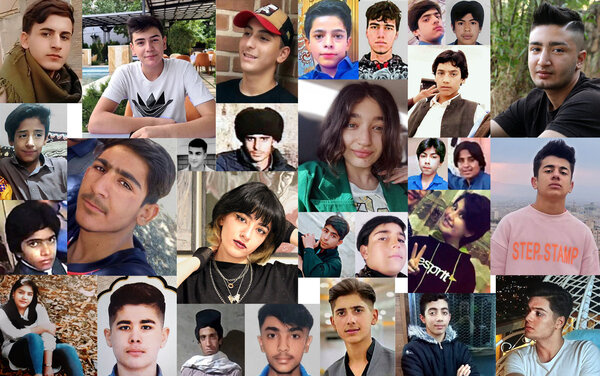Photos of Iranian juveniles killed by Iran’s security forces during protests since mid-September
The UN has issued its latest report of the Iran regime’s human rights violations, documenting a record number of executions in 2022, the arrests of thousands of children, and reports of torture and abuse by security forces.
Nada al-Nashif, the deputy head of human rights, summarized to the Human Rights Council in Geneva:
The overall human rights situation in the Islamic Republic of Iran has markedly deteriorated against the backdrop of continuously worsening socio-economic conditions, aggravated by sanctions and the lingering impact of the COVID-19 pandemic.
The report covers developments since the start in mid-September of nationwide protests for rights, justice, and gender equality. The demonstrations were sparked by the death of Mahsa Amini in police custody, after she was detained and reportedly beaten by morality police over “inappropriate attire”.
About 20,000 protesters were detained, including thousands of children. At least 44 juveniles, including 10 girls, were reportedly killed by security forces using lethal force.
See also Iran Protests: “They Gagged Us With Our Hijabs” — The Abuse and Rape of Detainees
In addition to torture and abuse of detainees, Nashif cited sexual violence against men, women, and children; denial of medical care; dire sanitary conditions, contaminated drinking water; and overcrowding in prisons.
The report said “respect for the right to freedom has significantly deteriorated” with the regime more stringent in punishing women who do not wear hijab. It noted President Ebrahim Raisi’s decree on August 15, a month before the death of Mahsi Amini, authorizing face-recognition technology to track women and those who criticize hijab. Legislation before Parliament expands the scope of offenses, mandating imprisonment, flogging, and other sanctions.
The UN also “notes with serious concern” the execution of 582 people in 2022, a 75% increase on 2021’s total of 333. Three children were among those put to death.
Of the hangings, 250 were for drug-related offenses, the highest figure since 2017.
And Nashif spoke of more than 1,000 students — the large majority of them girls — affected by suspected poisonings in 91 schools in 20 provinces between November and March 2.
See also Who is Poisoning Iran’s Schoolgirls?
Iran’s representative to the UN in Geneva, Ali Bahraini complained that the report was “politically motivated, biased and unfair”. He insisted, “Iran was committed to promoting and protecting human rights, and interacted and cooperated with the United Nations human rights mechanisms.”


Security Forces Clash with Protesters in Baluchistan
https://iranwire.com/en/news/117821-security-forces-clash-with-protesters-in-baluchistan/
Political Sponsors Say Trial For Iranian Rapper Salehi Under Way Behind Closed Doors
https://www.rferl.org/a/iran-rapper-salehi-trial-closed-doors-protests/32472787.html
“The UN has issued its latest report of the Iran regime’s human rights violations, documenting a record number of executions in 2022, the arrests of thousands of children, and reports of torture and abuse by security forces.”
And that amounts to what exactly?